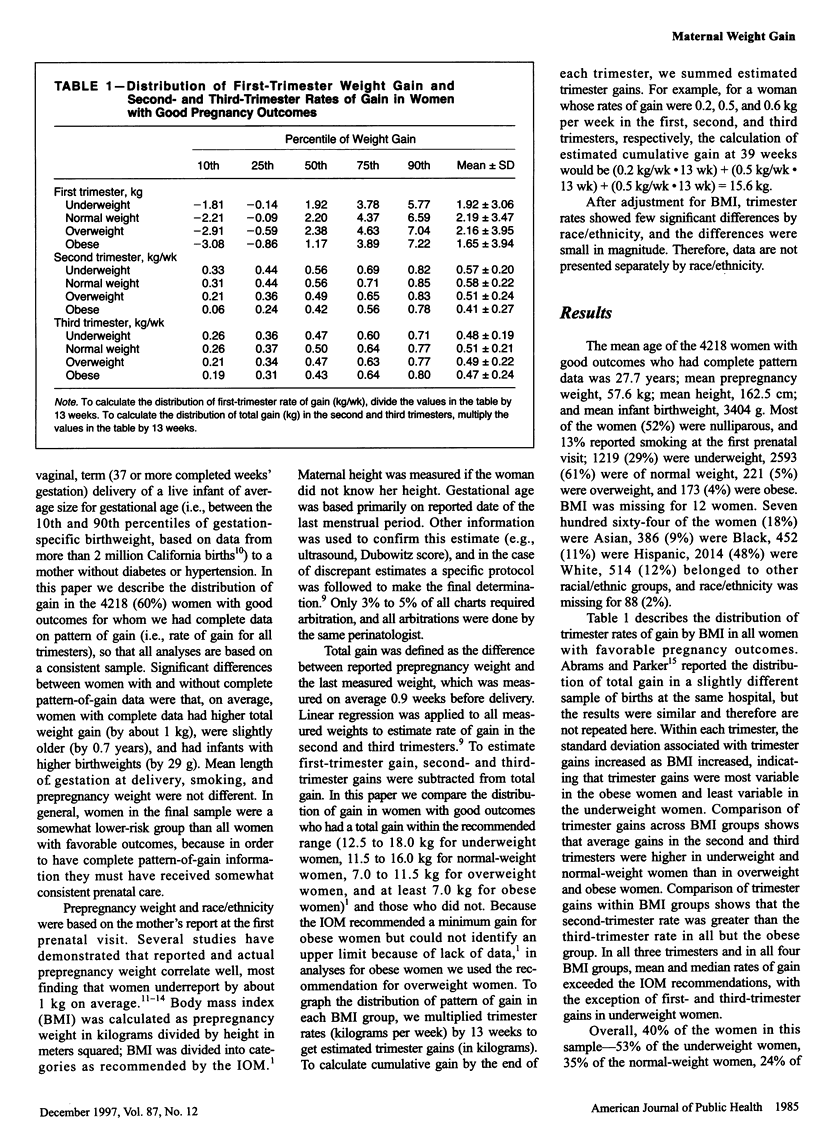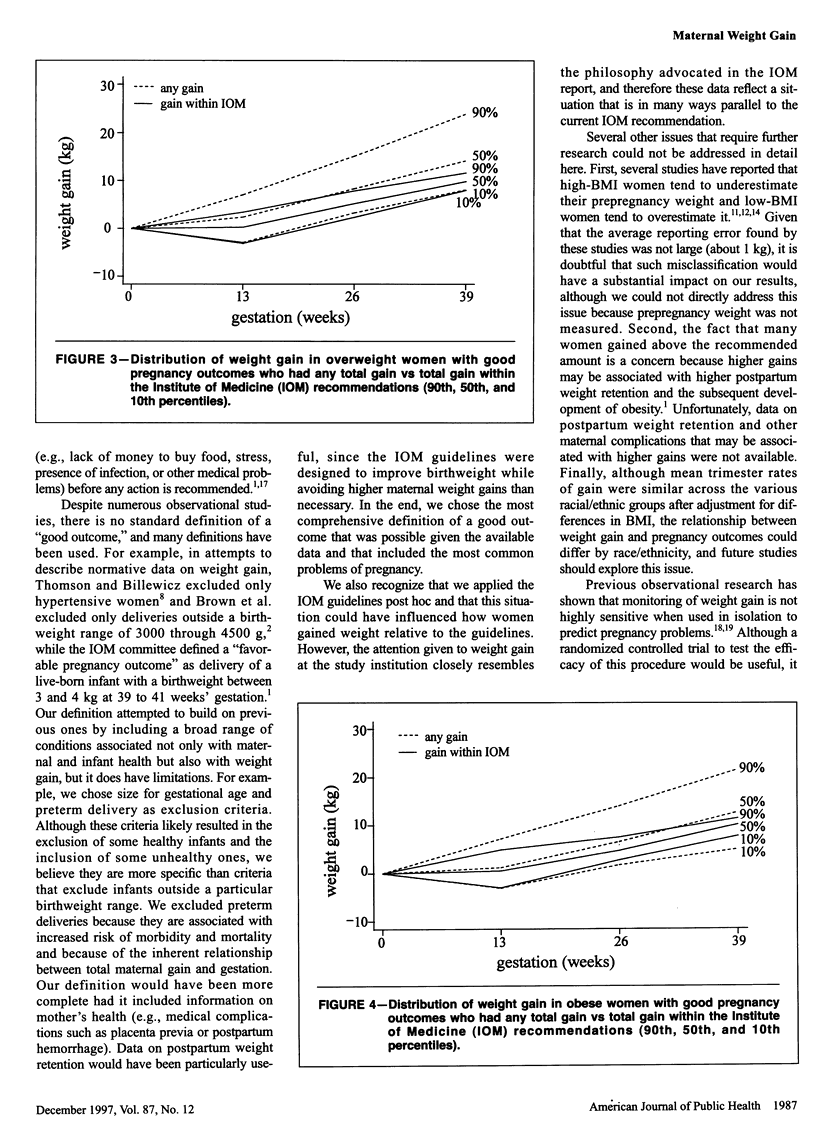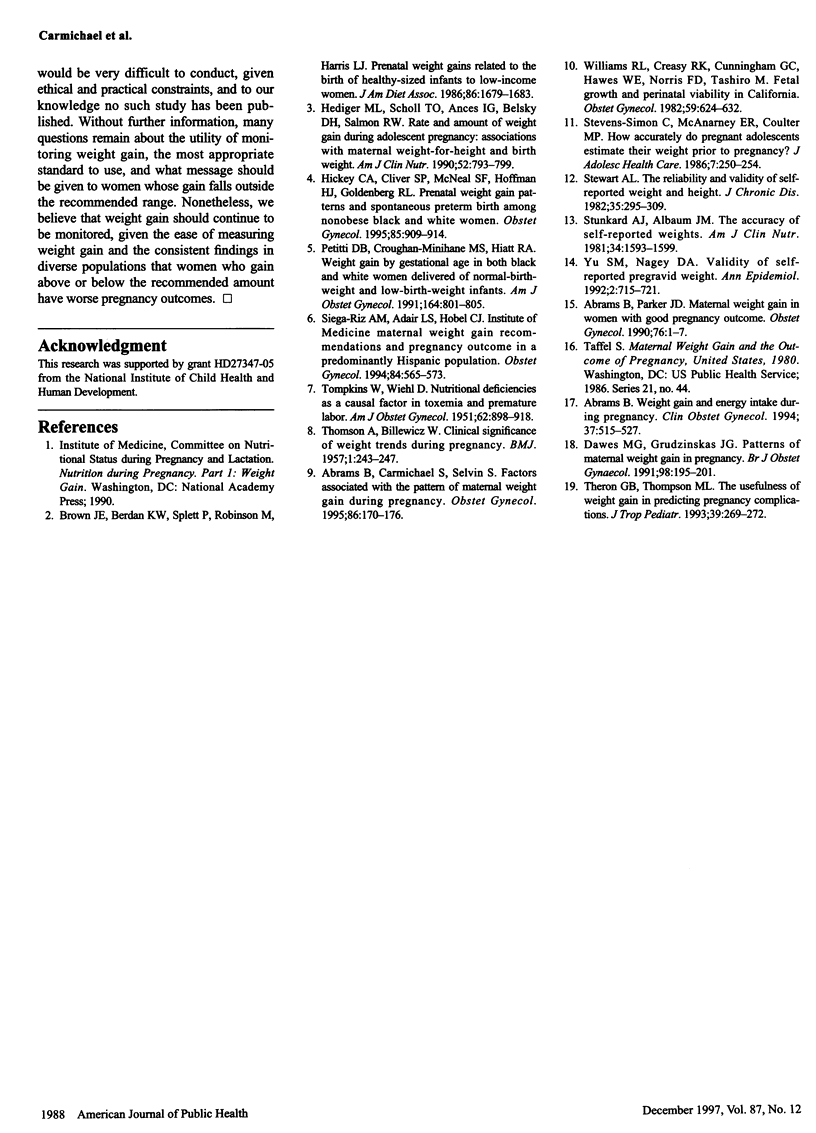Abstract
OBJECTIVES: This study describes the pattern of maternal weight gain in women with good pregnancy outcomes and provides data to fill in the provisional weight-gain charts published by the Institute of Medicine (IOM) in 1990. METHODS: We selected 7002 women with good outcomes (defined by factors related to maternal and infant health) from the University of California, San Francisco, Perinatal Database. For each body mass index category, we compared percentiles of weight gain by trimester in women who achieved the IOM recommendations for total gain and those who did not. RESULTS: Trimester rates of gain varied by body mass index category and exceeded IOM guidelines in all groups. Forty percent of these women with good outcomes had total gains within the guidelines and provided data to complete the IOM weight-gain charts. CONCLUSIONS: Most women in this good-outcome sample would have been suspected of being at increased risk for poor outcome on the basis of their weight gain. This confirms the IOM recommendation that evaluation of the underlying causes of excessively high or low weight gain during pregnancy is necessary before appropriate interventions can be applied.
Full text
PDF




Selected References
These references are in PubMed. This may not be the complete list of references from this article.
- Abrams B., Carmichael S., Selvin S. Factors associated with the pattern of maternal weight gain during pregnancy. Obstet Gynecol. 1995 Aug;86(2):170–176. doi: 10.1016/0029-7844(95)00119-c. [DOI] [PubMed] [Google Scholar]
- Abrams B., Parker J. D. Maternal weight gain in women with good pregnancy outcome. Obstet Gynecol. 1990 Jul;76(1):1–7. [PubMed] [Google Scholar]
- Abrams B. Weight gain and energy intake during pregnancy. Clin Obstet Gynecol. 1994 Sep;37(3):515–527. doi: 10.1097/00003081-199409000-00005. [DOI] [PubMed] [Google Scholar]
- BILLEWICZ W. C., THOMSON A. M. Clinical significance of weight trends during pregnancy. Br Med J. 1957 Feb 2;1(5013):243–247. doi: 10.1136/bmj.1.5013.243. [DOI] [PMC free article] [PubMed] [Google Scholar]
- Brown J. E., Berdan K. W., Splett P., Robinson M., Harris L. J. Prenatal weight gains related to the birth of healthy-sized infants to low-income women. J Am Diet Assoc. 1986 Dec;86(12):1679–1683. [PubMed] [Google Scholar]
- Dawes M. G., Grudzinskas J. G. Patterns of maternal weight gain in pregnancy. Br J Obstet Gynaecol. 1991 Feb;98(2):195–201. doi: 10.1111/j.1471-0528.1991.tb13368.x. [DOI] [PubMed] [Google Scholar]
- Hediger M. L., Scholl T. O., Ances I. G., Belsky D. H., Salmon R. W. Rate and amount of weight gain during adolescent pregnancy: associations with maternal weight-for-height and birth weight. Am J Clin Nutr. 1990 Nov;52(5):793–799. doi: 10.1093/ajcn/52.5.793. [DOI] [PubMed] [Google Scholar]
- Hickey C. A., Cliver S. P., McNeal S. F., Hoffman H. J., Goldenberg R. L. Prenatal weight gain patterns and spontaneous preterm birth among nonobese black and white women. Obstet Gynecol. 1995 Jun;85(6):909–914. doi: 10.1016/0029-7844(95)00067-2. [DOI] [PubMed] [Google Scholar]
- Petitti D. B., Croughan-Minihane M. S., Hiatt R. A. Weight gain by gestational age in both black and white women delivered of normal-birth-weight and low-birth-weight infants. Am J Obstet Gynecol. 1991 Mar;164(3):801–805. doi: 10.1016/0002-9378(91)90519-w. [DOI] [PubMed] [Google Scholar]
- Siega-Riz A. M., Adair L. S., Hobel C. J. Institute of Medicine maternal weight gain recommendations and pregnancy outcome in a predominantly Hispanic population. Obstet Gynecol. 1994 Oct;84(4):565–573. [PubMed] [Google Scholar]
- Stevens-Simon C., McAnarney E. R., Coulter M. P. How accurately do pregnant adolescents estimate their weight prior to pregnancy? J Adolesc Health Care. 1986 Jul;7(4):250–254. doi: 10.1016/s0197-0070(86)80017-1. [DOI] [PubMed] [Google Scholar]
- Stewart A. L. The reliability and validity of self-reported weight and height. J Chronic Dis. 1982;35(4):295–309. doi: 10.1016/0021-9681(82)90085-6. [DOI] [PubMed] [Google Scholar]
- Stunkard A. J., Albaum J. M. The accuracy of self-reported weights. Am J Clin Nutr. 1981 Aug;34(8):1593–1599. doi: 10.1093/ajcn/34.8.1593. [DOI] [PubMed] [Google Scholar]
- TOMPKINS W. T., WIEHL D. G. Nutritional deficiencies as a casual factor in toxemia and premature labor. Am J Obstet Gynecol. 1951 Oct;62(4):898–919. doi: 10.1016/0002-9378(51)90178-0. [DOI] [PubMed] [Google Scholar]
- Theron G. B., Thompson M. L. The usefulness of weight gain in predicting pregnancy complications. J Trop Pediatr. 1993 Oct;39(5):269–272. doi: 10.1093/tropej/39.5.269. [DOI] [PubMed] [Google Scholar]
- Williams R. L., Creasy R. K., Cunningham G. C., Hawes W. E., Norris F. D., Tashiro M. Fetal growth and perinatal viability in California. Obstet Gynecol. 1982 May;59(5):624–632. [PubMed] [Google Scholar]
- Yu S. M., Nagey D. A. Validity of self-reported pregravid weight. Ann Epidemiol. 1992 Sep;2(5):715–721. doi: 10.1016/1047-2797(92)90016-j. [DOI] [PubMed] [Google Scholar]


